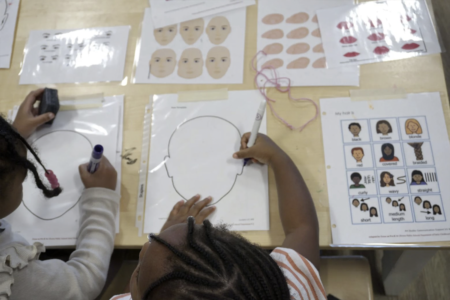The architects of the Pretrial Fairness Act, part of the broader SAFE-T Act, are sounding the alarm over new guidance from Cook County State’s Attorney Eileen O’Neill Burke. She’s directing her prosecutors to object “on the record” whenever a judge opts for electronic monitoring instead of pretrial detention.
According to Chicago Appleseed Center for Fair Courts co-executive director Naomi Johnson, the move shows that O’Neill Burke supports a more punitive approach to prosecution. The Cook County State’s Attorney’s Office did not respond to The TRiiBE’s request for comment.
A memo outlining O’Neill Burke’s directive began circulating on X (formerly Twitter) just before 6:00 p.m. last night. Advocates of the Pretrial Fairness Act are calling the move a contradiction. As a Democratic candidate, O’Neill Burke expressed the importance of the SAFE-T Act on the campaign trail, calling the law “a significant step towards reforming our laws to prioritize fair outcomes over systemic biases.”
“On December 2, 2024, I issued a policy requiring that you seek detention in specific circumstances. I am now directing you to object on the record whenever you have sought detention and the Judge has chosen to place the defendant on electronic monitoring/home confinement,” Burke’s memo reads. In addition, she expressed her concerns with the electronic monitoring system, which is now handled by the Chief Judge’s Office.
Activist, legal worker and campaign policy coordinator Matthew McLoughlin found out about O’Neill Burke’s memo from the X post.
“We’re really surprised by the directive and the tone. When the State’s Attorney was campaigning for office, she was very clear that she supported the Pretrial Fairness Act, and this policy, in our opinion, flies in the face of that,” McLoughlin said. He’s also the founding member of the Chicago Community Bond Fund, which collaborated with other organizations to abolish the bail system and helped craft the Pretrial Fairness Act as part of a broader coalition.
Johnson sees Burke’s shift as undermining judges.
“From my perspective, [this directive] undermines the discretionary decision-making power of judges, which is really at the center of the whole [Pretrial Fairness] Act,” Johnson said. “Judges should be making decisions based on the facts of a case, and that power is not held by state’s attorneys.”
Judges decide whether someone accused of a crime will be incarcerated or released pretrial. Under the Pretrial Fairness Act, a law abolishing cash bail and limiting pretrial detention for most defendants, judges spend more time assessing each case than before, according to McLoughlin.
“Every person who appears in first appearance court is presumed innocent, and thanks to the Pretrial Fairness Act, judges now are receiving dramatically more information about every case that’s in front of them and making decisions in what the judge’s mind is the appropriate way to move that case forward,” he explained.
Data from the Circuit Court of Cook County shows that since the Pretrial Fairness Act was implemented in 2023, more than 80% of people are showing up for their court appearances while on pretrial release. They’re also less likely to be rearrested for another crime.
The Pretrial Fairness Act has also been financially beneficial for people who have historically been impacted by pretrial arrests, as The TRiiBE’s Corli Jay previously reported.
Violent crime is also down in Chicago, and this new directive from O’Neill Burke doesn’t align with those downward trends, Johnson said. Chicago had the fewest murders in the first quarter of 2025 since 2019.
“Chicago is in line with other cities nationwide, and our violent crime rates have been reducing over time and continue to do so,” Johnson said. “So these policies of requesting detention are really not consistent with where Chicago is currently, and are taking on a punitive approach as opposed to the restorative approach that Eileen O’Neill Burke campaigned on.”
The Illinois Network for Pretrial Justice shared an overview of O’Neill Burke’s new protocol through a press release, which outlines guidance for Assistant State’s Attorneys (ASAs) on how to apply the new electronic monitoring policy.

Through the new electronic monitoring policy, O’Neill Burke is reinforcing a misconception about electronic monitoring programs under the Cook County Sheriff’s Office and the Office of the Chief Judge, McLoughlin said.
“In the statement we sent out this morning, we linked to a spreadsheet released by the Office of the Chief Judge from 2022 that showed the makeup of who was on his electronic monitoring program,” McLoughlin explained. “We picked that sheet in particular because it predates the implementation of the Pretrial Fairness Act. The Chief Judge has had people facing the most serious charges on his electronic monitoring program prior to the Pretrial Fairness Act, prior to this decision to sunset the Sheriff’s electronic monitoring program.”
On April 1, Cook County Sheriff Tom Dart announced that his office would stop accepting new electronic monitoring participants. That responsibility now lies with the Chief Judge’s Office (OCJ), which is led by Chief Judge Timothy Evans. Dart’s office will still monitor the more than 1,500 people currently in the system for electronic monitoring.
In the memo, O’Neill Burke raises concerns about the policy shift, suggesting that the Chief Judge’s Office “has not ensured that they have sufficient properly trained staff to monitor individuals ordered to electronic monitoring instead of detention.”
She added, “I believe this is a serious threat to public safety.”
“The idea that they are not equipped to respond to public safety needs, or to monitor people facing serious charges, is just detached from the reality that we’ve been living in for years in Cook County, where the Chief Judge’s office has done just that,” McLoughlin said.
Since taking office in December 2024, O’Neill Burke has been making moves that run counter to policies enacted under her progressive predecessor Kim Foxx. Right now, it’s difficult to say whether O’Neill Burke is attempting to undo all of what Foxx achieved in office, Johnson said.
“Her policy agenda is going to result in the incarceration of Chicagoans and especially Black and brown people in this city,” Johnson said, referring to O’Neill Burke. “Kim Foxx was at least trying to move out of that direction of prosecution.”
The post SAFE-T Act advocates sound the alarm on Cook County State’s Attorney’s new electronic monitoring policy appeared first on The TRiiBE.







